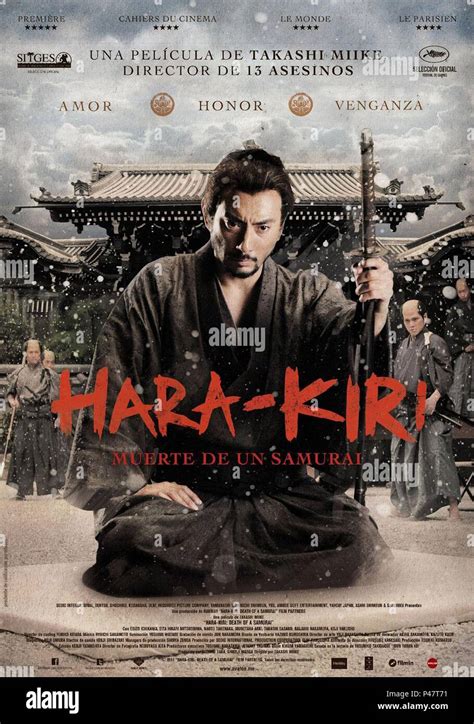Hara-Kiri: Death of a Samurai

Description:
Harakiri: Death of a Samurai is Takashi Miike's 2011 remake of the 1962 classic. Set in late Edo-period Japan, a weary ronin named Hanshiro Tsugumo arrives at a samurai house seeking to die by ritual seppuku, aiming to expose the clan's hypocrisy. What follows is a tightly wound meditation on honor, power, and vengeance, as past and present collide. Miike uses stark framing, restrained violence, and moral interrogations to create a haunting, morally fraught tragedy.Keywords:
Edo Period, Drama, Samurai, Jidaigeki, Revenge, RemakeIs Hara Kiri: Death of a Samurai a remake?
Yes, "Hara-Kiri: Death of a Samurai" is a remake of the 1962 film "Harakiri," directed by Masaki Kobayashi. The 2011 version, directed by Takashi Miike, revisits the original story, which explores the themes of honor, sacrifice, and the samurai code. Both films are adaptations of the novel "Bushido" by Jun'ichirō Tanizaki and share similar plots, but Miike's version incorporates modern filmmaking techniques and cinematography while staying true to the core themes of the original.
Is Harakiri worth watching?
"Hara-Kiri: Death of a Samurai," directed by Takashi Miike, is a visually stunning and thought-provoking film that explores themes of honor, sacrifice, and the rigid codes of samurai life. The story revolves around a ronin who seeks to commit ritual suicide in a feudal Japan setting, revealing deeper societal critiques along the way. The film's cinematography is striking, and the performances, particularly by the lead actors, are compelling. If you appreciate slow-burning, artistic dramas with philosophical undertones, this film is definitely worth watching.
Is the Harakiri remake good?
"Hara-Kiri: Death of a Samurai," directed by Takashi Miike, is a remake of the 1962 film "Harakiri." Released in 2011, this version is notable for its stunning cinematography and modern storytelling techniques, while staying true to the original's themes of honor, sacrifice, and the critique of the samurai code. Critics generally praise it for its artistic approach and emotional depth, although some may prefer the classic version for its historical context. Overall, it is considered a strong and worthwhile adaptation.
What is the message of Harakiri?
"Hara-Kiri: Death of a Samurai," directed by Takashi Miike, explores themes of honor, sacrifice, and the absurdity of rigid societal codes. Set in feudal Japan, it critiques the samurai code, highlighting how the pursuit of honor can lead to tragic consequences. The film illustrates the conflict between personal integrity and societal expectations, suggesting that blind adherence to tradition can result in suffering and injustice. Ultimately, it poses profound questions about the nature of honor and the human cost of upholding it.
Explore More Categories:
Romantic Rivalry Introspection Sensory Deprivation Absurdity Conscientiousness Prostitution Romantic Comedy Drama Career Challenges Literary Adaptation Duty Drama Comedy Overpopulation Cybernetics Captivity Psychological Games Suburbia Nasa Royalty Community Action Crime Thriller Escapism Innovation Paradise Metafiction